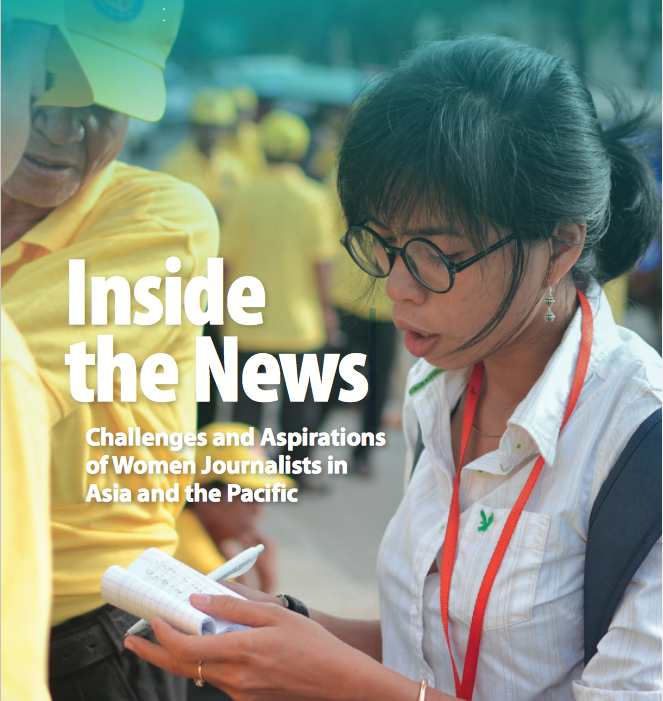Kudos to four of our members who are working to improve the lives of women working in the media and interacting in digital spaces.
Today, 8 March 2016, is International Women’s Day, celebrated since 1911 as a chance to reflect on progress, call for change and applaud acts of determination by women. In past years, IFEX members have commemorated International Women’s Day with articles about free speech and feminism, women’s rights and surveillance, and the challenges to freedom of assembly that many women around the world face. The Media Institute of Southern Africa has profiled women in Southern Africa who are improving media freedom in the region, PEN International has highlighted contributions made by women writers and journalists, and the IFEX Secretariat has profiled some of the challenges faced by women human rights advocates. This year, IFEX takes the opportunity to give kudos to four of our members who are working to improve the lives of women working in the media and interacting in digital spaces.
Using tech to fight tech-based violence against women
Bytes For All / Campaign: Take Back the Tech!
It has become a common narrative: a woman tweets about her work as an activist and all of a sudden she starts receiving threats of sexual violence from people opposed to her and her work. Another woman is in a secret relationship and her boyfriend threatens to share intimate photos and videos online if she tells anyone about them. Though familiar to people all over the world, these examples of technology-related violence against women are actually drawn from cases studies produced by Bytes For All, an NGO based in Pakistan. Bytes For All is the regional partner in a global campaign aimed at reclaiming information and communication technology (ICT) in an effort to end violence against women. The campaign, entitled Take Back the Tech! calls on all ICT users – especially women and girls – to use technology and communication platforms to carry out activism against gender-based violence. In addition to compiling case studies, Bytes For All collects and maps reports of violence against women online and their ability to access justice in cases of technology driven violence. The goal of their work is to bear witness to these violations and to “make the invisible visible”.
Naming, shaming, and trolling those trolls
Fundación Karisma / Campaign: Alerta Machitroll
It’s probably happened to you. You’re scrolling through your Facebook feed on a lazy Sunday – chuckling at cat videos and drooling (or rolling your eyes) at photos of an acquaintance’s’ brunch – when a comment jolts you in your seat. It’s a comment that degrades. One that perpetuates an unjust narrative and promotes harmful stereotypes. It’s a string of words that – yes – acts as a form of violence against women. Guess what? You’re not the only one who’s outraged. And you can do something about it. Enter “Alerta Machitroll” – an online tool that encourages people to denounce and share instances of online violence against women. Created by Colombian civil society group Fundación Karisma with the support of the Web Foundation, Alerta Machitroll democratizes the naming and shaming process by encouraging web users around the world to reply to harmful comments with images of “Machitrolls” – a humorous, fictional species meant to depict Internet trolls – and to share screenshots of these interactions on its website. The campaign was launched in December 2015 and will be discussed in radio programs and online hangouts before and after International Women’s Day. Learn more about Machitroll-related events on Karisma’s Facebook page.
How about a level playing field?
Human Rights Watch / Campaign: #WATCH4WOMEN
Since 2012, women in Iran have been banned from attending sports events alongside men. When several young women staged a peaceful protest against the ban in 2014, they were arrested and detained. One of them served five months in prison. In October 2015, Human Rights Watch launched a digital advocacy campaign to promote respect for women’s rights in the country and to pressure the International Volleyball Federation (FIVB) to ban Iran from hosting the tournaments as long as it forbade women from entering its stadiums.
Let’s talk about women in media
IFJ Asia-Pacific / Report: Inside the News: Challenges and Aspirations for Women Journalists in Asia and the Pacific
Twenty years after the U.N.’s Fourth World Conference on Women stressed the need for increased participation of women in decision-making in and through the media, still only 27% of top management jobs in media organizations are held by women. To show the achievements and lingering challenges for women in the media, the International Federation of Journalists, along with UNESCO and UNWomen, launched a report on 22 June 2015 on the specific trials faced by women working in the media in Asia and the Pacific. The report is meant as a starting point for a desperately needed discussion on the ability of the media to influence change within the industry on the representation of women and gender issues, and is a resource for those working towards gender equity in the media.

Bytes for All/APC Women’s Rights Programme

Fundación Karisma

IFJ
Caro Rolando, Erin Woycik and Hiba Zayadin are Section Editors at IFEX.
